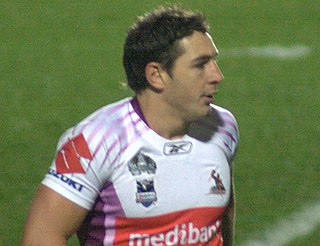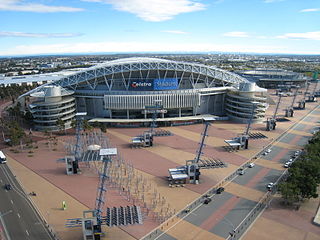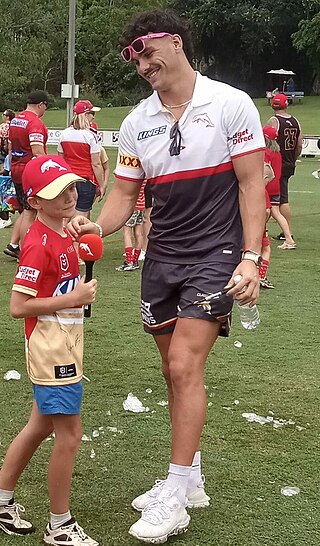
The 1995 Rugby League World Cup was the eleventh World Cup for mens national rugby league teams. It was held between 7-28 October and hosted by England and Wales and was won by Australia who beat England at Wembley Stadium, their eighth World Cup win and fifth in succession.

The Sydney Football Stadium, commercially known as Allianz Stadium and previously Aussie Stadium, was a football stadium in the Moore Park suburb of Sydney, New South Wales, Australia. Built in 1988 next to the Sydney Cricket Ground, the stadium was Sydney's premier rectangular field venue for rugby league, rugby union and football.

The Tonga national rugby league team represents Tonga in rugby league football. They are currently the fifth ranked team in the world. The team was formed to compete in the 1986 Pacific Cup, and have competed at six Rugby League World Cups, starting in 1995 and continuing consecutively until the most recent tournament. Their best result was at the 2017 Rugby League World Cup, where they were semi-finalists.
The Fiji national rugby league team, nicknamed the Bati, has been participating in international rugby league football since 1992. The team is controlled by the governing body for rugby league in Fiji, Fiji National Rugby League (FNRL), which is currently a member of the Asia-Pacific Rugby League Confederation (APRLC). Fiji have thrice reached the semi-finals of the Rugby League World Cup, in 2008, 2013 and 2017, and are currently ranked 6th in the International Rugby League's World Rankings. They are coached by Fijian Wise Kativerata, and their captain is Kevin Naiqama.

William Slater is an Australian former professional rugby league footballer who played in the 2000s and 2010s. Slater is the current coach of the Queensland Maroons, whom he coached to victories in the 2022 and 2023 State of Origin series.

Manu Mapuhola Mafi-Vatuvei, also known by the nickname "The Beast", is a New Zealand former professional rugby league footballer who was both a Tonga and New Zealand international representative winger. He previously played for the New Zealand Warriors in the NRL and for the Salford Red Devils in the Super League. Vatuvei was a member of the New Zealand national team that won the 2008 World Cup. He became the Warriors' top try scorer, and the first player in NRL history to score at least 10 tries in 10 consecutive seasons.

The 2003 Rugby World Cup Final was the final match of the 2003 Rugby World Cup, the fifth edition of the Rugby World Cup competition organised by the International Rugby Board (IRB) for national rugby union teams. The match was played at Stadium Australia in Sydney on 22 November 2003, and was contested by Australia and England. The 20-team competition consisted of a group stage, from which eight squads qualified for the knockout stage. En route to the final, Australia finished first in Pool A with four wins and no losses or draws before defeating Scotland in the quarter-final and New Zealand in the semi-final. England finished on top of Pool C and, like Australia, went undefeated with four victories and no draws before beating Wales in the quarter-final and France in the semi-final.

The 2019 Rugby World Cup was the ninth edition of the Rugby World Cup, the quadrennial world championship for men's rugby union teams. It was hosted in Japan from 20 September to 2 November in 12 venues all across the country. The opening match was played at Ajinomoto Stadium in Chōfu, Tokyo, with the final match being held at International Stadium Yokohama in Yokohama. This was the first time that the tournament had taken place in Asia and outside the traditional Tier 1 rugby nations.

The 2003 Rugby World Cup was the fifth Rugby World Cup and was won by England. Originally planned to be co-hosted by Australia and New Zealand, all games were shifted to Australia following a contractual dispute over ground signage rights between the New Zealand Rugby Union and Rugby World Cup Limited. The pre-event favourites were England, regarded by many at the time as the best team in the world. New Zealand, France, South Africa and defending champions Australia were also expected to make strong showings, with New Zealand being second favourites after victory in the southern-hemisphere Tri-Nations championship.
Jermaine McGillvary is an English professional rugby league footballer who plays on the wing for the Wakefield Trinity in the RFL Championship. He has played for the England Knights, England and Great Britain at international level.
The 2013 Rugby League World Cup final was the conclusive game of the 2013 Rugby League World Cup tournament and was played between New Zealand and Australia on 30 November 2013 at Old Trafford, Manchester, England. Australia won the final by 34 points to 2 in front of a sell-out crowd, finishing the tournament undefeated. They reclaimed the cup from New Zealand, who had defeated them in the 2008 final. The Kangaroos won the Rugby League World Cup for the tenth time, and the first time since 2000. Their five-eighth, Johnathan Thurston was named man-of-the-match.
The 1988 Rugby League World Cup final was the conclusive game of the 1985–1988 Rugby League World Cup tournament and was played between New Zealand and Australia on 9 October 1988 at Eden Park in Auckland, New Zealand. Australia won the final by 25 points to 12 in front of a New Zealand rugby league record attendance of 47,363. Australia, the defending champions, won the Rugby League World Cup for the 6th time.
The 1995 Rugby League World Cup final was the conclusive game of the 1995 Centenary World Cup tournament and was played between England and Australia on 28 October 1995 at the Wembley Stadium in London, England. Australia won the final by 16 points to 8 in front of 66,540 fans. Australia, the defending champions, won the Rugby League World Cup for the 8th time.

Tevita Pangai Junior is an Australian professional rugby league footballer and former professional boxer who plays as a prop for the Dolphins in the National Rugby League (NRL). He has previously played for the Brisbane Broncos, Penrith Panthers, and Canterbury-Bankstown Bulldogs in the NRL and for Tonga and New South Wales at representative level.

Brian To'o is an Australian and Samoa international rugby league footballer who plays as a winger for the Penrith Panthers in the NRL.

The 2019 Rugby League World Cup 9s was the first staging of the Rugby League World Cup 9s tournament and took place on 18 and 19 October 2019 at Sydney's Bankwest Stadium. The tournament featured teams from 12 International Rugby League member countries, 4 of which also fielded teams in the women's tournament. In the men's final, Australia defeated New Zealand, while in the women's final, New Zealand defeated Australia.

Herbert Felix Farnworth is an English professional rugby league footballer who plays as a centre for the Dolphins in the National Rugby League (NRL).

The 2022 Challenge Cup Final was the 121st final of the Rugby Football League's Challenge Cup knock-out competition, which was contested between Huddersfield Giants and Wigan Warriors. It took place on 28 May 2022 at the Tottenham Hotspur Stadium. Wigan won the cup for the 20th time by beating Huddersfield 16–14.

The 2021 Rugby League World Cup final was the rugby league match to determine the winner of the 2021 Rugby League World Cup, played between Australia and Samoa on 19 November 2022 at Old Trafford in Manchester, England.

The 2021 Rugby World Cup final was the final match of the 2021 Rugby World Cup, the ninth edition of the women's Rugby World Cup and the seventh organised by World Rugby for women's national rugby union teams. The match was contested between two-time champions England, and hosts and five-time and defending champions New Zealand on 12 November 2022 at Eden Park in Auckland, New Zealand, postponed from the previous year. This was the fifth time that these two nations met in a Rugby World Cup final, following the 2002, 2006, 2010 and 2017 editions. New Zealand won the Rugby World Cup for a record sixth time, beating England 34–31. New Zealand captain Ruahei Demant was named the player of the match.

















